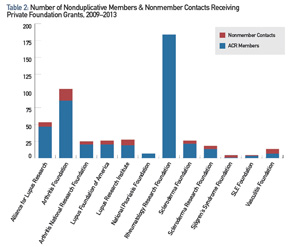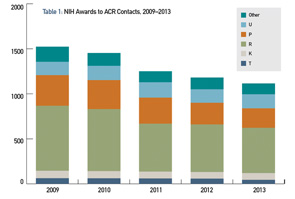
The challenges and opportunities that confront academic rheumatology are multidimensional and complex. One such challenge is the current crisis in funding for rheumatic disease research and training in the U.S. The crisis is a matter of great concern to both the American College of Rheumatology (ACR) and the Rheumatology Research Foundation because support for research and training is crucial to Advancing Rheumatology! in the most fundamental sense of these words.
This crisis also ultimately threatens our ability to further improve outcomes for the millions of patients with rheumatic diseases. However, it is difficult to fully understand the enormity of this problem or to develop solutions without understanding extensive data on trends in funding for rheumatology research and training.
To address this challenge, the ACR and the Foundation have taken on the task of collecting data about funding, analyzing it and sharing it with those who have a vested interest. It’s clear that we all have existential interest in these data and their implications.
Researching Funding Sources
In an effort to gather meaningful and reliable information about the observation that the rheumatology research enterprise was at grave risk, the ACR’s Committee on Research and the Foundation collaborated this spring to gather comprehensive data on rheumatology research funding. Your professional organization and its 501(c)(3) charitable arm for research and training collected and analyzed information on funding from the National Institutes of Health (NIH) and 12 private foundations spanning 2009 through 2013. Funding information was then cross-referenced with the ACR’s customer database, which includes the ACR/ARHP members and nonmembers who have accessed ACR programs and services in order to identify members of the rheumatology community who were receiving funding for research from the NIH and other foundations.
The analysis produced many insights into the current state of funding for rheumatology research. One notable discovery in the report is that over the past five years, the rheumatology community received 6,570 awards, representing 1.79% of total funds distributed by the NIH. Because of the ACR’s and Foundation’s mutual interest in advancing the rheumatology profession, special attention was paid during analysis to awards that serve as the stepping stones for researchers and physicians along their paths to becoming independent investigators, such as fellowship training (T), mentored (K) and independent research (R) awards. As shown in Table 1 (below left), the number of these awards given to ACR contacts has dropped, particularly for Rawards, which fell 30%. The decrease in R awards is especially concerning because receiving and maintaining R-level awards is an essential part of an investigator’s ability to continue a career in academic medicine.
It’s critical that rheumatology professionals take note of the decline in NIH funding. Strong research funding attracts the best people to our training programs across the country, showcasing what makes rheumatology the most exciting field of medicine, from discovery to therapeutics. It supports, directly or indirectly, the training of most rheumatologists and health professionals at one point in their careers. If the downward trend in funding continues, it could have serious implications for the future of our subspecialty. We must continue to advocate for the NIH in our work though the Government Affairs Committee and RheumPAC.
Support from Private Organizations
Another focus of the funding analysis was to get a better picture of the support ACR contacts receive from private organizations. From 2009 through 2013, the rheumatology community received 450 awards provided by participating private foundations with a focus on rheumatology or rheumatic diseases, representing 66.1% of the total funding offered by the organizations. As shown in Table 2 (opposite), we are particularly proud to point out that 177 ACR members received a total of 192 research grants from our Foundation, excluding education and training awards, over the past five years. All awards from the Rheumatology Research Foundation are given to the ACR’s members and make up nearly 40% of the awards and grants given to the ACR’s contacts from private foundations during that time frame. The other participating organizations that provided the most funding to ACR contacts were the Arthritis Foundation, which gave awards to 90 contacts, and the Alliance for Lupus Research, which gave awards to 47 contacts.

Understanding Leads to Solutions
This report is just the start of our efforts to fully understand the state of funding for rheumatology research and training. The ACR and the Foundation will continue to collect these data every year in order to paint a clearer picture of the support for our research and track its trajectory. We also will bring together a wide range of stakeholders in rheumatology research for a summit to identify potential gaps in funding and opportunities for collaboration. In the meantime, leaders from both the ACR and the Foundation will continue to meet with officials at various NIH institutes to foster the exchange of ideas and reinforce the importance of supporting rheumatology research. We realize that many fine rheumatology researchers feel they may need to leave the field because they cannot garner the funding needed to sustain their research while supporting themselves and their families. Our hope is that by better understanding the crisis in funding for rheumatology research, we will be able to develop solutions that will help address the shortfalls researchers are facing, continue to advance the field and lead to breakthroughs that improve the health of people with rheumatic diseases.
You can find more details on the research funding analysis in the Foundation’s full report. To read it, visit http://www.rheumatology.org/Foundation/Research/The_State_of_Funding_for_Rheumatology_Research.

Dr. Joseph Flood is president of the ACR and a rheumatologist at the Columbus Arthritis Center and adjunct professor of internal medicine in the Division of Rheumatology at The Ohio State University College of Medicine and Public Health, both in Columbus. Contact him at [email protected].

David R. Karp, MD, PhD, is president of the Rheumatology Research Foundation and chief of the Rheumatic Diseases Division at the University of Texas Southwestern Medical Center in Dallas. Dr. Karp has worked with the Foundation for nearly a decade and is directly invested in rheumatology research.




